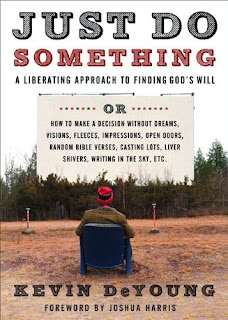 by Kevin DeYoung
by Kevin DeYoung
2009, 128 pages
Remember Gideon and the fleece? God kept the fleece dry while the ground was wet, and wet while the ground was dry. Persuaded by God's reassurance, Gideon took on the task of clearing the foreign oppressors out of Israel. (
More about him later.)
Too often, we want God to do the same for us, and on far less significant matters than a direct commission from God. This need for God's direct guidance on matters ranging from what to wear to where to live can keep us from "just doing something," anything, until God gives us a "sign."
Kevin DeYoung takes on this attitude by telling us that all we need to do is follow the counsel of Ecclesiastes 12 - "Fear God and keep his commandments" - and then move forward as God gives us the desire and wisdom to do so. He starts by looking at how our uncertainty as to what to do with our lives can keep us stuck on "The Long Road to Nowhere" (Chapter 1's title). Of course, part of the reason we get stuck is that we confuse various understandings of "God's Will in Christianese" - the focus of the second chapter - His will of decree, of desire, and of direction. DeYoung explains five reasons for us being so "Directionally Challenged" in the third chapter, from the best - we genuinely want to please God - to the worst - we are cowards. All of us will undoubtedly recognize ourselves in one of the reasons DeYoung gives.
Matching the five reasons for our treating God as "Our Magic 8-Ball God" (the title of Chapter 4) are five problems DeYoung explains relating to asking God to give us such direct guidance, from our focus on non-moral decisions to the hopeless subjectivism of such a quest. Again, most Christians will find themselves identified in one or more of these problems in our attitude to God.
DeYoung then sets out "A Better Way" (the title of Chapter 5) to walk in God's will: Don't worry; seek God's Kingdom - as Jesus makes clear in the Sermon on the Mount. DeYoung makes clear in Chapter 6 - "Ordinary Gifts and Supernatural Surprises" that even the apostles generally relied on the wisdom that God gave them, rather than direct guidance from the Spirit. In Chapter 7 - "Tools of the Trade" - DeYoung makes clear that the wrong use of the Bible is a form of testing God (
just as it was for timid Gideon), leaving us to instead follow "The Way of Wisdom" (the title of Chapter 8) - relying on Scripture (studied, rather than simply flipped open randomly), on good counsel, and on prayer.
DeYoung's insights lead naturally to the last two chapters. Chapter 9 deals with "Work, Wedlock, and God's Will" - the big issues that everybody is thinking of when they want to know what God wants with their lives. Finally, "The End of the Matter" is the living example of his grandfather, who has lived, and is living, the commands of Ecclesiastes 12 - "Fear God and keep his commandments, for this is the whole duty of man," enabling him to
Just Do Something for God and his neighbor - as we should.
I hope it's obvious how much I've left unsaid from this book that I have recently heard used as the basis for a brilliant sermon on the petition "Your will be done." If you want to be liberated from doubt and uncertainty, read the whole thing, not because God revealed that this is the book especially for you, but because it's as edifying as it is entertaining.
You can pick up a copy of
Just Do Something at
Amazon.com here and
Amazon.ca here.
 by Jacob Abbott
by Jacob Abbott


